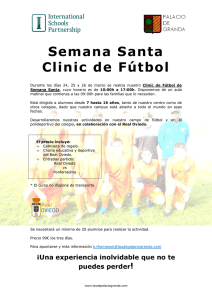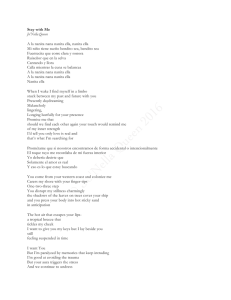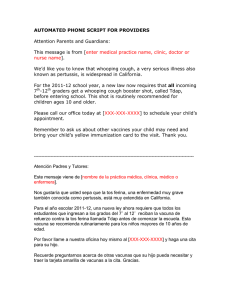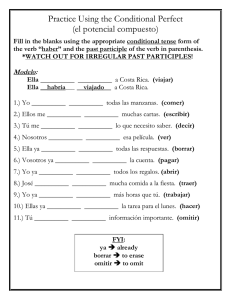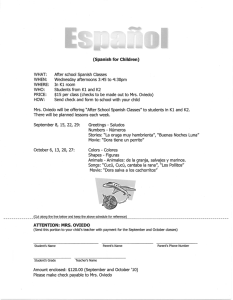pgs. 26 Final - Philadelphia
Anuncio
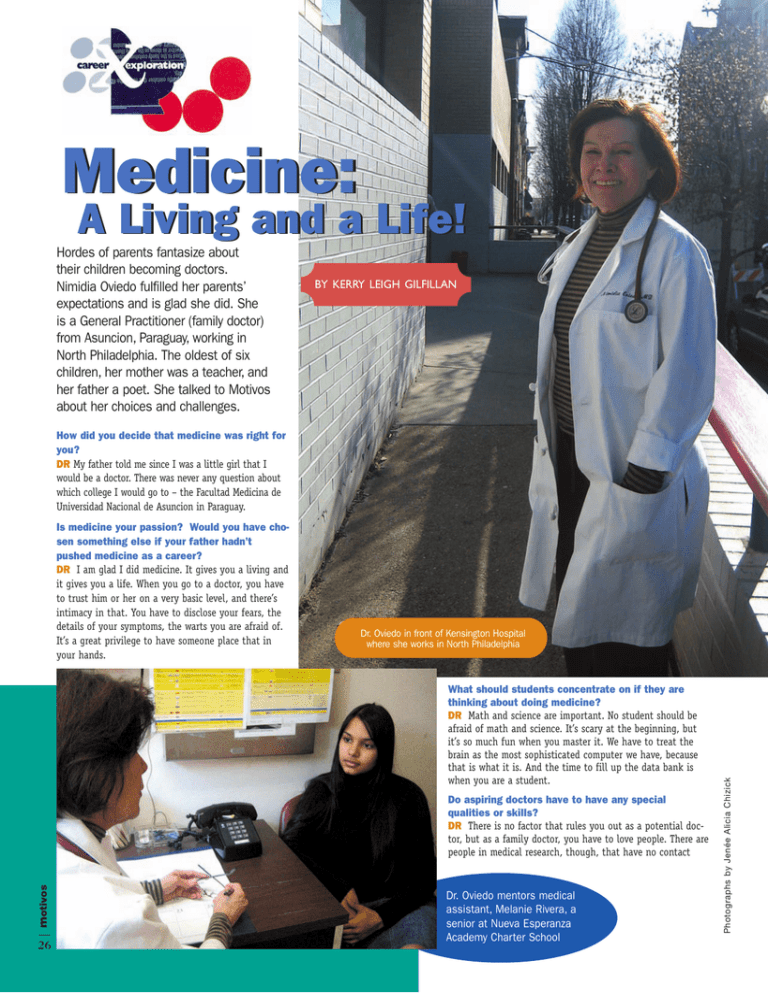
Medicine: A Living and a Life! Hordes of parents fantasize about their children becoming doctors. Nimidia Oviedo fulfilled her parents’ expectations and is glad she did. She is a General Practitioner (family doctor) from Asuncion, Paraguay, working in North Philadelphia. The oldest of six children, her mother was a teacher, and her father a poet. She talked to Motivos about her choices and challenges. BY KERRY LEIGH GILFILLAN How did you decide that medicine was right for you? DR My father told me since I was a little girl that I would be a doctor. There was never any question about which college I would go to – the Facultad Medicina de Universidad Nacional de Asuncion in Paraguay. Dr. Oviedo in front of Kensington Hospital where she works in North Philadelphia What should students concentrate on if they are thinking about doing medicine? DR Math and science are important. No student should be afraid of math and science. It’s scary at the beginning, but it’s so much fun when you master it. We have to treat the brain as the most sophisticated computer we have, because that is what it is. And the time to fill up the data bank is when you are a student. motivos Do aspiring doctors have to have any special qualities or skills? DR There is no factor that rules you out as a potential doctor, but as a family doctor, you have to love people. There are people in medical research, though, that have no contact 26 Dr. Oviedo mentors medical assistant, Melanie Rivera, a senior at Nueva Esperanza Academy Charter School Photographs by Jenée Alicia Chizick Is medicine your passion? Would you have chosen something else if your father hadn’t pushed medicine as a career? DR I am glad I did medicine. It gives you a living and it gives you a life. When you go to a doctor, you have to trust him or her on a very basic level, and there’s intimacy in that. You have to disclose your fears, the details of your symptoms, the warts you are afraid of. It’s a great privilege to have someone place that in your hands. Was it hard as a woman going into medicine? DR Actually, it was fun for me, because at that time, it was not common for women to go to medical school. Women were nurses – doctors were for curing and nurses were for caring. I was a sort of pio- Kerry Leigh Gilfillan, a graduate of Cornell University originally neer, the only woman in the from South Africa, is an aspiring school. But I love to be among men broadcast journalist. because men don’t treat women as a threat. Men nurture you, while women compete with you. You know, women don’t dress for men, we dress for other women. Why did you come to the United States? DR My son was living here and he was in an accident. He was on a respirator, and when they unplugged it, he couldn’t breathe on his own. He came through it, but it was a very frightening time. The idea of losing your own son is something so deep, it’s hard to describe. I couldn’t talk for a long time about it, and even now, I cannot really. But now I am in the States and living a totally different life, which I see as a gift. Most of us have trouble seeing our traumas as gifts… DR I feel that I grew up through fractures, crisis and pain. I sort of drift in a comfortable situation, following a routine, and then I experience something where I am gasping for air and I feel I can’t endure the pain. I come out a different person, a better person, because I know that I am a survivor. “I am always curious and ready to learn.” Were there any issues around language, did you encounter any prejudice as a Latina immigrant? DR It’s not a question of who is or who is not an immigrant. In some areas, you don’t see the same prejudice against Asians, for instance, as you do against Latinos, because the feeling is that Latinos are coming in hordes, like an invasion, and they threaten the American population’s identity, whatever that means. We can see blacks from Africa being beaten by blacks from Philadelphia. In some ways, race has nothing to do with it. It’s more cultural, I think. I work in North Philadelphia, where most of the Hispanic population has Puerto Rican roots, and on my first day, a patient I had seen said to the nurse, “What planet did you get that doctor from?” So a common language, also, does not necessarily mean that two people will identify with one another. Did you do something that seemed peculiar to her? DR I told her to eat oranges to balance her electrolytes, but I used the word naranja. Puerto Ricans call an orange a china. They are the same fruit, but we give them different Spanish names. Do you find that you feel at home in the Latino communities here? DR I’m at a point in my life where I feel at home almost anywhere. My father taught me you should not lose two things: a sense of adventure and a sense of humor. By sense of adventure, I mean like Alice in Wonderland. She became very small, very big but she never wasted time trying to figure out why she was small, why she was big, she just solved each situation as it came along. I think it was very wise of my father and it made me feel comfortable anywhere. I am always curious and ready to learn. Dr. Oviedo arrived from Paraguay without a United States medical license and could not practice at first. Foreign medical graduates have to complete a required period of medical residency training, and take a United States medical credentialing exam. Careers in Nursing will be covered in the next edition of Motivos! Medicina como una Carrera El sueño de muchos padres de familia en nuestra sociedad es que sus hijos crezcan y se conviertan algún día en médicos. Esa es la historia de Nimidia Oviedo, doctora en medicina general quien ahora trabaja en el norte de Philadelphia. Oviedo nació en una familia de seis hermanos en Asunción, Paraguay, siendo ella la mayor de los hijos. Su madre fue maestra y su padre poeta. Su padre siempre le decía desde niña que seria doctora de medicina y a cuál universidad debía asistir, fue siempre así. Ella dice estar muy contenta con su decisión. “Matemática y ciencia son importantes para estudiar medicina,” subraya Oviedo y agrega que nadie debe temer a esas ciencias, ya que son muy divertidas, y la mente debe ser tratada como la computadora más sofisticada que se tiene. Para ser médico la persona tiene que sentir cariño hacia el ser humano, agrega. De Students from Edison High acuerdo con Oviedo, School’s Medical Records Shop” hay muchas carreras en ask Dr. Oviedo about her career. medicina y lo más importante es que le guste a la persona para ser creativo en el trabajo. Oviedo llegó a Estados Unidos durante una época muy difícil cuando su hijo se vio envuelto en un grave accidente, la idea de perderlo fue muy espantosa, difícil de describir. Pero ahora ella vive en este país y dice que fue un regalo ya que tiene una vida totalmente diferente. Antes de todo esto, ella tenía una rutina diferente, vivía sin complicaciones. La experiencia con su hijo la hizo una persona diferente, una sobreviviente. Como inmigrante Oviedo piensa que las diferencias en la sociedad son mas culturales, ella trabaja en el norte de Philadelphia donde la mayor parte de la población Hispana tienen raíces en Puerto Rico y hay ciertas diferencias en cuanto al lenguaje entre las personas hispanas que son de diferentes países, explica Oviedo. Pero ella dice sentirse en casa en cualquier lugar, su padre siempre le dijo que las únicas dos cosas que no se deben perder son: el sentido de la aventura y el sentido del humor. Ella finalizó diciendo sentir siempre curiosidad y estar lista para aprender. Los Estados Unidos no reconoce las licencias de medico de otros países, cuando la doctora Oviedo llego a este país de Paraguay se encontró con la necesidad de cumplir un periodo de residencia y entrenamiento en uno de los hospitales Americano. Además necesitaba tomar los exámenes médica de los Estados Unidos para adquirir su licencia para ejercer en este país. S O U R C E / F U E N T E : M I L L E R M AY E R AT T O R N E Y S AT L A W motivos with other people, and they are quite happy that way. There is a whole spectrum of careers in medicine...the important thing is to enjoy what you do, so that you are able to be creative in your work. 27

